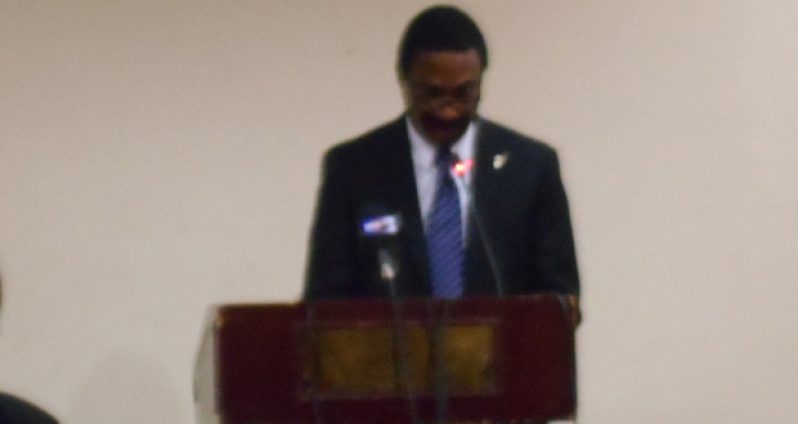EVEN AS Nigeria, Brussels and Paris continue to grapple with the after-effects of acts of terrorism, a thorough assessment is needed here in Guyana to determine the money laundering and terrorist financing risks that exist, Attorney General and Legal Affairs Minister Basil Williams said yesterday.

The Attorney General, at the time, was delivering remarks at a Money Laundering and Financing of Terrorism (ML/FT) National Risk Assessment Training Workshop organised by the World Bank and the Legal Affairs Ministry. Currently, Guyana has an Anti-Money Laundering and Countering the Financing of Terrorism (AML/CFT) Act in place, along with other connected legislation governing supervisory bodies, financial institutions, law enforcement and foreign affairs.
The National Assembly in 2015 had also passed the Anti-Terrorism and Terrorist Related Activities Bill, the AML/CFT (Amendment) Bill No. 1 and 2, and the AML/CFT Regulations. Currently, a draft amendment bill to the AML/CFT Act is being prepared to ensure that the assets and funds of terrorists or terrorist organizations are immediately frozen by the Court.
The Legal Affairs Minister said those steps were important for the country to have a strong regulatory framework in place. “A strong AML/CFT regulatory framework will contribute to the protection of the integrity and economic stability of our financial institutions. It will also strengthen governance and financial administration. This is important, not only at the national level, but also at the international level,” he said.
These amendments are in keeping with recommendations of both the Financial Action Task Force (FATF) as well as the Caribbean Financial Action Task Force (CFATF).
But even with the requisite legislation in place, the Legal Affairs Minister said, this was just the first step.
“The solutions needed to combat these crimes will only become manifest through a thorough assessment to determine what risks exist and the nature of these risks. We will be able to uncover any threat and our vulnerable areas, and what consequences exist because of these vulnerabilities and threats,” he explained. Once a risk assessment is done, the partners in this fight will be able to formulate plans and strategies to mitigate the money laundering and terrorism financing risks.
“It will assist us to improve our existing regulatory framework by using the empirical data that the assessment will provide. We will be more able to understand what problems exist, allowing us to target our resources where it will be most effective,” the Attorney General further explained.
The need for a risk assessment was highlighted in the first recommendation made by the Financial Action Task Force (FATF). The international financial watchdog had called on countries to identify, assess and understand the money laundering and terrorists financing risks within their jurisdiction.
Williams said it was important for all stakeholders to get on board. “Each stakeholder plays an integral role in exposing threats and vulnerabilities and their consequences. All of you bring to the table various perspectives and solutions on how to deal with these crimes. Not only are you finding solutions, but throughout the entire process, you are building capacity which will enable us to undertake future risk assessments without support.”
The crimes of money laundering and financing of terrorism, though different, hamper the effectiveness of the financial system in any country and render it vulnerable.
Senior Financial Sector Specialist with the World Bank, Stuart Yikona, and Finance Secretary Dr. Hector Butts were among the officials present at the Princess Hotel for the forum yesterday.



.jpg)








